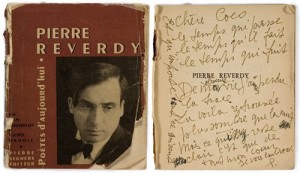POETRY IN TRANSLATION (CCXLIV): Pierre REVERDY, (1889 – 1960), FRANCE, “Tard dans la vie”, “Late in life”, “Amurgul vieţii”
Tard dans la vie
Pierre Reverdy
(1889, Narbonne – 1960, Solesmes)
Je suis dur
Je suis tendre
Et j’ai perdu mon temps
A rêver sans dormir
A dormir en marchant
Partout où j’ai passé
J’ai trouvé mon absence
Je ne suis nulle part
Excepté le néant
Mais je porte caché au plus haut des entrailles
A la place ou la foudre a frappé trop souvent
Un coeur ou chaque mot a laissé son entaille
Et d’où ma vie s’égoutte au moindre mouvement
(From the volume: La liberté des mers)
Late in life
(Pierre Reverdy)
I am callous
I am tender
and I have wasted my time
dreaming without sleeping
sleeping while walking
everywhere I’ve gone
I’ve found myself absent
I belong nowhere
except the void
But I carry hidden high up in my bowels
At the spot where lightning has too often struck
A heart where each word has left its mark
And where my life trickles away with the slightest movement
(English translation by Michael Tweed)
Amurgul vieţii
(Pierre Reverdy)
sunt dur
sunt tandru
mi-am risipit o viaţă
visând cu ochi deschişi
dormind mereu în mers
şi peste tot trecut-am
doar regăsind absenţa
ne mai fiind aiurea
decât în negru-abis
si totuşi, am un spirit, adânc în trupul meu
acolo unde-un fulger mă scapără prea des
în suflet port o rimă urmându-mă mereu
făcând să-mi scurgă viaţa în chip neînţeles.
Rendered in Romanian by Constantin ROMAN,
© 2014, Copyright Constantin ROMAN, London
SHORT BIO: Pierre Reverdy (1889 – 1960), The son of a winegrower, Reverdy was born in southern France, in the region of Narbonne, and grew up near the Montagne Noire. The Reverdy ancestors were stonemasons and sculptors associated with work commissioned for churches.
Reverdy arrived in Paris in October 1910, devoting his early years there to his writing. It was in Paris, at the artistic enclave centered around the Bateau-Lavoir in Montmartre that he met he became friends with numerous artists such as Pablo Picasso, Georges Braque & Henri Matisse but also with literati such as: Guillaume Apollinaire, Max Jacob, Louis Aragon, André Breton, Philippe Soupault and Tristan Tzara. All would come to admire and champion Reverdy’s poetry.
In the first Surrealist Manifesto, André Breton hailed Reverdy as “the greatest poet of the time.” Louis Aragon said that for Breton, Soupault, Éluard and himself, Reverdy was “our immediate elder, the exemplary poet.” In 1917, together with Max Jacob, Vicente Huidobro and Guillaume Apollinaire, Reverdy founded the influential journal Nord-Sud (“North-South”) which contained many Dadaist and Surrealist contributions.
Reverdy was a somber man, whose strong spiritual inclinations led him over time to distance himself from the frenetic world of bohemian Paris. In 1926, in a ritualistic act signifying the renunciation of the material world, he burned many of his manuscripts in front of an assembly of friends. He converted to Catholicism and retreated with his wife, Henriette, to a small house located in proximity to a Benedictine abbey at Solesmes. Excluding intermittent periods when he visited Paris, Solesmes was his home for the next thirty years where he lived a “quasi-monastic life.”



No Comments so far ↓
Like gas stations in rural Texas after 10 pm, comments are closed.